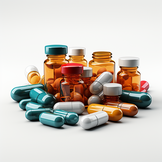Can high blood pressure medication cause erectile dysfunction?
- High Blood Pressure Medication and Erectile Dysfunction
- Addressing Sexual Side Effects with Healthcare Providers
- High Blood Pressure Drugs with Potential to Improve Erectile Dysfunction
- Types of Blood Pressure Drugs Linked to ED
- Switching to Newer Types of Beta-Blockers for Reduced Symptoms
- The Role of Zinc in Testosterone Production and Sexual Health
- Blood Pressure Drugs Less Likely to Cause ED
- Prevalence of Medication-Induced ED
- Importance of Discussing Concerns with Doctors
- How to Treat Erectile Dysfunction Due to Blood Pressure Medication?
- Can ED from High Blood Pressure be Reversed?
- Alternatives to Blood Pressure Medication that Do Not Cause Erectile Dysfunction

High Blood Pressure Medication and Erectile Dysfunction
High blood pressure medication is crucial in managing hypertension, but it has also been associated with erectile dysfunction (ED). Erectile dysfunction is a condition characterized by the inability to achieve or maintain an erection sufficient for satisfactory sexual performance. While the connection may seem daunting, it's essential to understand that not all blood pressure medications have this side effect, and even if they do, it doesn't affect everyone.
Addressing Sexual Side Effects with Healthcare Providers
Sexual side effects can be distressing, but they should never be a reason to discontinue medication without first consulting your healthcare provider. Some men may feel uncomfortable discussing this sensitive issue, but remember that medical professionals are there to help. Open communication is vital in understanding your situation and exploring potential solutions.
High Blood Pressure Drugs with Potential to Improve Erectile Dysfunction
Interestingly, certain blood pressure drugs can potentially improve erectile function. For instance, a class of medications called alpha-blockers can enhance blood flow to the penis, thereby improving erectile function. It's important to note that while these medications can help, they are not specifically designed to treat ED.
Types of Blood Pressure Drugs Linked to ED
Three types of high blood pressure drugs are most frequently associated with ED. These are thiazide diuretics, loop diuretics, and beta-blockers.
Thiazide diuretics are commonly prescribed to treat high blood pressure. They help your kidneys remove sodium and water, reducing blood volume and lowering pressure. However, they can also decrease blood flow to the penis and decrease testosterone levels, leading to ED.
Loop diuretics have similar effects.
They are potent medications used in treating high blood pressure, heart failure, and other conditions.Their mechanism may lead to reduced blood flow to the penis, thereby contributing to ED.
Beta-blockers work by blocking the effects of adrenaline on your heart, helping it beat more slowly and with less force. While they're effective at reducing blood pressure, some beta-blockers can lead to ED by limiting blood flow to the penis or interfering with the nervous signals necessary for an erection.
Switching to Newer Types of Beta-Blockers for Reduced Symptoms
If you're experiencing ED while on a beta-blocker, don't despair. There are newer types of beta-blockers that seem to cause fewer sexual side effects. Always discuss with your doctor before switching medications.
The Role of Zinc in Testosterone Production and Sexual Health
Zinc plays a crucial role in the production of testosterone, the primary male sex hormone responsible for sex drive and quality of sex. A deficiency in zinc can lead to reduced testosterone levels, which may, in turn, contribute to erectile dysfunction. Ensuring an adequate intake of zinc can support sexual health.
Blood Pressure Drugs Less Likely to Cause ED
In addition to alpha-blockers, other blood pressure medications such as ACE inhibitors and angiotensin-receptor blockers are less likely to cause erectile dysfunction. These drugs work by relaxing your blood vessels, which improves blood flow throughout your body, including the penis.
Prevalence of Medication-Induced ED
Erectile dysfunction as a side effect of blood pressure medication is more common than you might think. The percentage varies depending on the type of medication, but studies have shown that up to 25% of men on high blood pressure medication may experience some degree of ED.
Importance of Discussing Concerns with Doctors
It can't be stressed enough how crucial it is to discuss any concerns about sexual side effects with your doctor. They can provide alternatives, adjust your medication, or explore other potential causes of ED. For instance, high blood pressure itself can lead to ED, as can stress or depression.
How to Treat Erectile Dysfunction Due to Blood Pressure Medication?
If ED occurs as a result of taking blood pressure medication, the first step is to consult with your healthcare provider. They may recommend adjusting the dosage or switching to a different type of medication. Lifestyle changes, such as improving diet, increasing physical activity, and reducing alcohol and tobacco use, can also be beneficial.
For some men, taking ED medications like Viagra may be an option. However, it's critical to consult a healthcare professional before starting any new medication to avoid potentially harmful interactions.
Can ED from High Blood Pressure be Reversed?
Yes, in many cases, ED from high blood pressure can be reversed. This can be achieved by switching to a medication that's less likely to cause ED, making lifestyle changes, or treating the ED directly with medications or devices.
Alternatives to Blood Pressure Medication that Do Not Cause Erectile Dysfunction
If you're worried about the impact of blood pressure medication on your sexual health, you might want to explore alternatives. As mentioned earlier, alpha-blockers, ACE inhibitors, and angiotensin-receptor blockers are less likely to cause ED. Also, lifestyle modifications can have a significant impact on blood pressure and overall health.
In conclusion, while some high blood pressure medications can cause ED, not everyone will experience this side effect. It's essential to talk openly with your doctor about any concerns you have, as there are always alternatives and solutions available to ensure you can maintain both your cardiovascular and sexual health.



